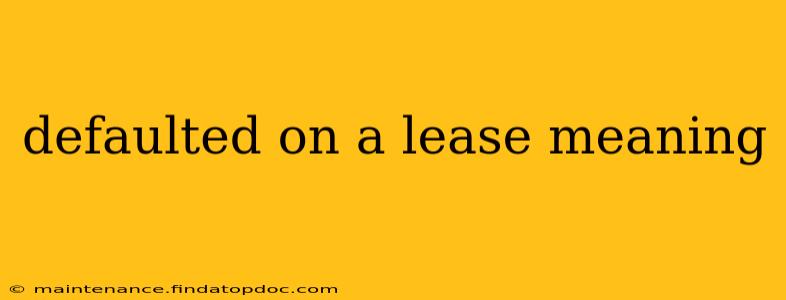"Defaulted on a lease" means that a tenant has failed to fulfill the terms and conditions outlined in their lease agreement. This is a serious breach of contract with significant consequences for both the tenant and the landlord. Understanding what constitutes a default, its implications, and how to prevent it is crucial for both parties.
What constitutes a default on a lease?
A lease default can occur in several ways, and the specific actions considered a default are explicitly stated in the lease agreement. Common reasons for lease default include:
- Non-payment of rent: This is the most frequent cause of lease default. Missing even a single rent payment, depending on the lease terms, can be considered a default.
- Violation of lease terms: This encompasses a broad range of actions, such as:
- Damage to property: Exceeding normal wear and tear, causing significant damage, or failing to report damage promptly.
- Illegal activities: Engaging in illegal activities on the premises.
- Subletting without permission: Renting the property or a portion of it to another party without the landlord's written consent.
- Breach of pet clause: Owning a pet without permission or violating restrictions on pet type or size.
- Failure to maintain property: Neglecting basic upkeep responsibilities outlined in the lease, such as cleaning or maintaining appliances.
- Breach of quiet enjoyment: Disturbing other tenants excessively with noise or other disruptive behaviors.
What are the implications of defaulting on a lease?
The consequences of defaulting on a lease can be severe for the tenant. They may include:
- Eviction: The landlord has the legal right to initiate eviction proceedings, leading to the tenant's removal from the property.
- Legal fees: The landlord can pursue legal action to recover unpaid rent and other costs associated with the default, including attorney fees and court costs.
- Damage claims: The tenant may be held responsible for repairing any damage to the property beyond normal wear and tear.
- Negative impact on credit score: A lease default can be reported to credit bureaus, negatively affecting the tenant's credit score, making it difficult to secure future housing or loans.
- Difficulty renting in the future: Landlords often check tenant history, and a default can make it challenging to find new housing.
What happens if a landlord defaults on a lease?
While less common, landlords can also default on their responsibilities outlined in the lease. This might involve failing to maintain the property in habitable condition, violating the tenant's right to quiet enjoyment, or ignoring necessary repairs. Tenants facing a landlord's default have recourse, often including:
- Withholding rent: In some jurisdictions, tenants can withhold rent until repairs are made, though it is crucial to follow local laws and document everything carefully.
- Legal action: Tenants can pursue legal action to compel the landlord to fulfill their obligations or seek termination of the lease.
How can I prevent defaulting on a lease?
Preventing a lease default requires proactive measures:
- Read the lease carefully: Thoroughly understand all terms and conditions before signing. If anything is unclear, seek clarification.
- Budget effectively: Ensure you can comfortably afford the monthly rent and any other associated costs, such as utilities and renter's insurance.
- Maintain open communication: Communicate with your landlord promptly if you anticipate any difficulties in meeting your financial obligations or if repairs are needed.
- Maintain the property: Treat the property with respect and take care to avoid damage.
- Keep accurate records: Maintain records of rent payments, communication with the landlord, and any repairs or maintenance requests.
By understanding the ramifications of a lease default and taking proactive steps, both tenants and landlords can avoid the costly and stressful consequences of a breach of contract. Remember, communication and adherence to the lease terms are key to maintaining a positive landlord-tenant relationship.
